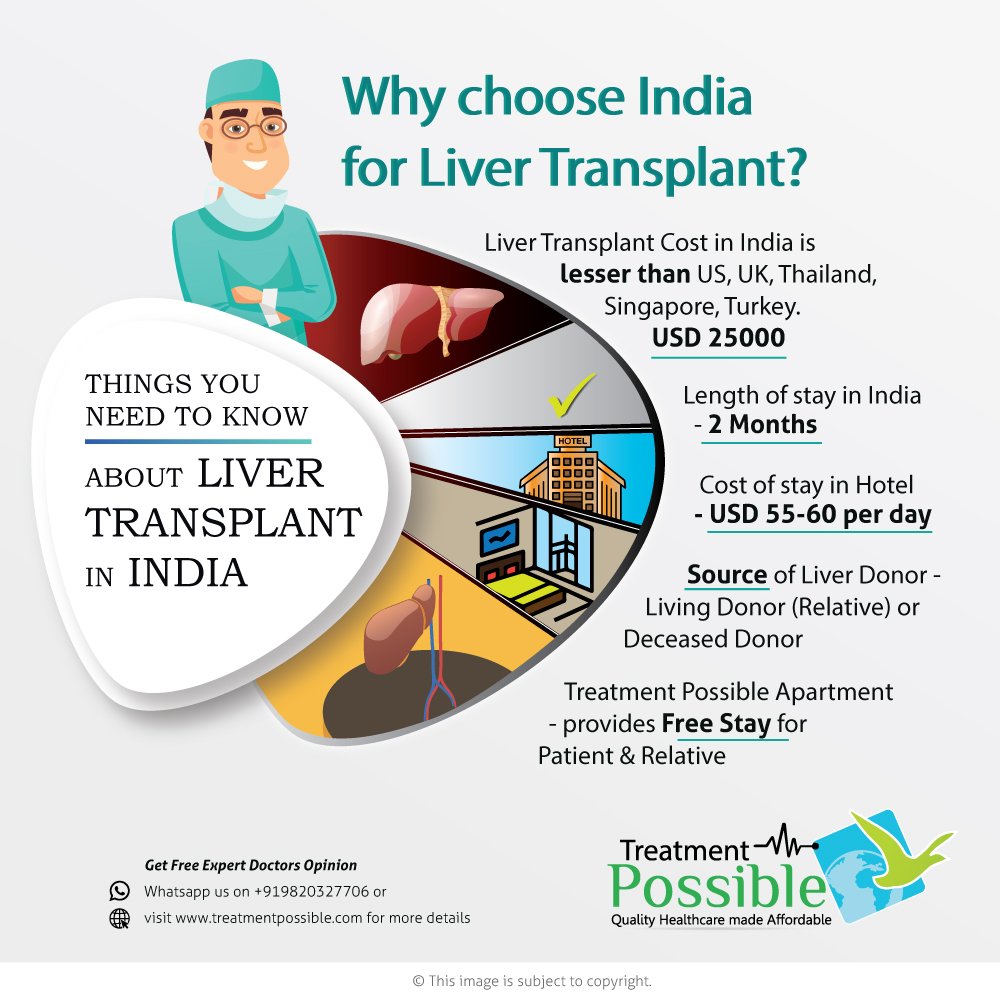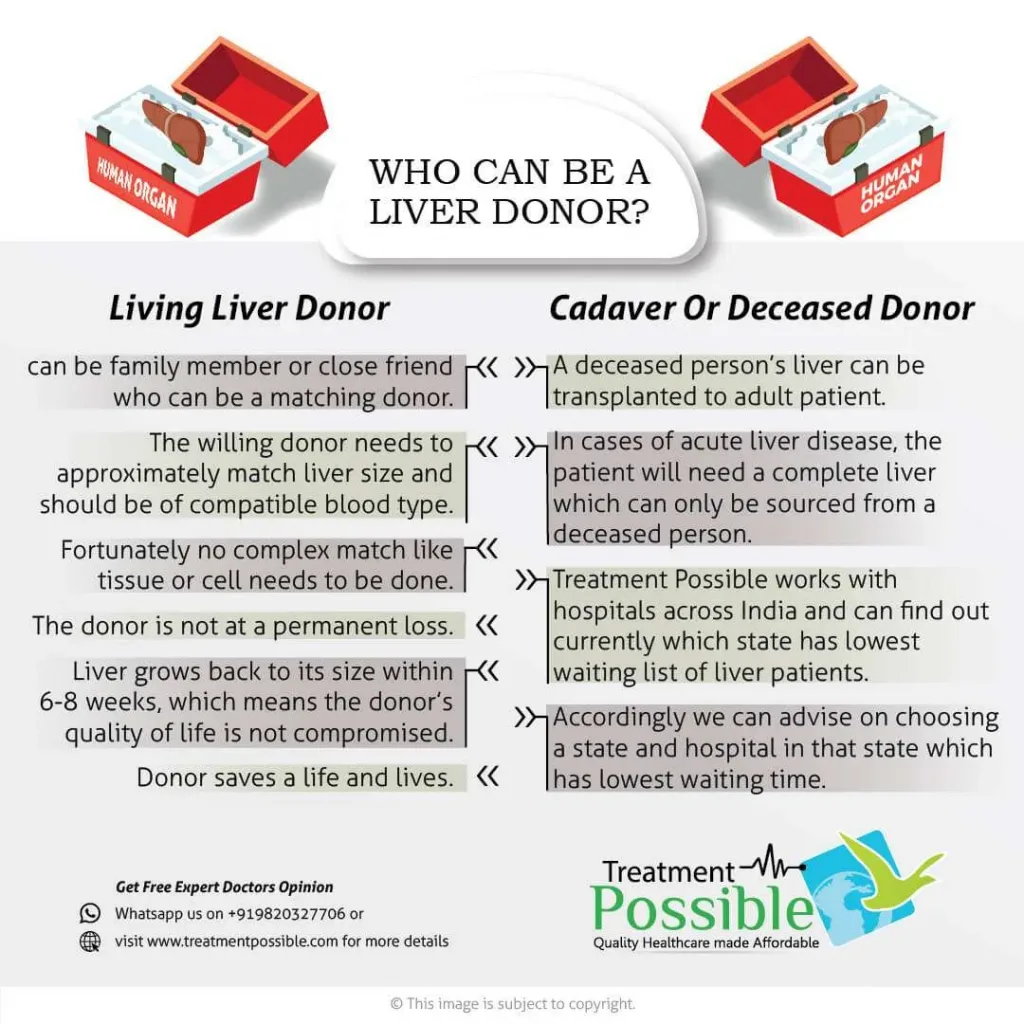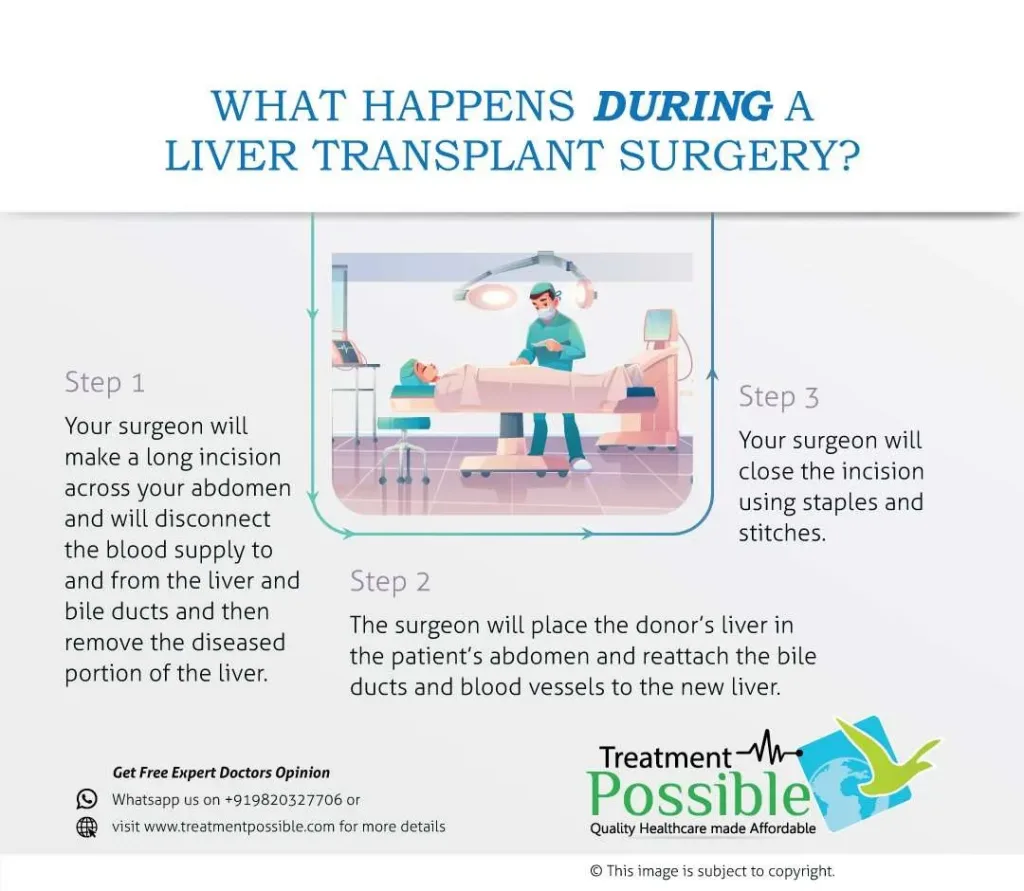Liver Transplant in India
Verified By: Dr. Rakesh Rai (American Society of Transplant Fellowship, MD, FRCS, CCST)
Liver Transplant Surgery in India
India is the third most preferred medical destination in the world due to the affordable treatment packages provided by hospitals. A patient can undergo liver transplant surgery in India at a very low price with no compromises in the quality of treatment and medical services.
But planning for treatment in a foreign country with limited info can be very difficult. This article will help you to make a proper plan and help understand all the criteria and requirements for undergoing liver transplant surgery in India.
What is the Liver Transplant Cost in India?
Treatment in India is very cheap and affordable compared to any other medical destination. The liver transplant price in India is $25000. That is 70% cheaper than most of the western countries like the U.S.A. You will get the entire package of pre-surgery investigation, surgery for the patient, surgery for the donor, hospital stay in a private room and medicines. You can email us about your query or get a second opinion of an experienced surgeon. Email: care@treatmentpossible.com
The video below will help you plan for Liver Transplant:
The table below shows the cost (USD) comparison for liver transplant surgery in various countries:
| Countries | Cost (USD) |
|---|---|
| India | $25000 |
| Thailand | $45000 |
| Singapore | $50000 |
| Turkey | $70000 |
| United Kingdom (U.K.) | $110000 |
| U.S.A | $580000 |
What is the Accommodation Cost in India?
Other than the cost of surgery you also need to be aware of other miscellaneous costs that comes up such as the cost of accommodation during your stay in India. The hospital provides stay only after surgery. While your total stay in India will be for 2 months (if a donor is available). But if you have to wait for a deceased person’s liver then you may have to wait anywhere from 1 month to 6 months. There will be a total of 3 people travelling (patient, donor and attendant).
| Cost of accommodation if you opt to stay in a hotel: | Cost of accommodation if you opt for a service apartment: |
|---|---|
| If you stay in a hotel then it will cost you a minimum of $55 a day. This means $1650 a month. | Cost of service apartment is free. |
| Your daily food will cost around $20 per day (minimum). That will be a total of $600 a month | You will only have to spend on food that will be an average cost of $180 a month (if you make it at home – which means you can cook as per your preference) |
| The total amount of expense spent on accommodation & food will be $2250 a month. | The total amount of expense will be the cost spent on food only. An average cost of $180 a month. |
In service apartments, you can cook your food which is much cheaper and healthier than ordering food from outside(hotel/restaurant). That means you save $400 per month on food alone. As service apartments are free of cost you save in total $2000 – $3000 every month on food and accommodation.
| Service | Cost (USD) |
|---|---|
| Transplant Procedure | $25000 |
| Stay in Hotel | $55 per Day |
| Service Apartments (Foreign Nationals) | Free |
| Food | $20 per day (minumum)** |
Total Duration of stay in India: 2 Months

Why is a Liver Transplant required?
The liver is one of the vital organs in the body and is essential for digesting food and removing all the toxic substances from the body. It helps to produce proteins necessary for blood clotting, it produces bile juice necessary for digestion, etc. A liver transplant is the surgical replacement of a damaged or diseased liver with a donor’s liver. If your liver does not function to the level needed to sustain your life, a liver transplant is the only option. If you are planning for your transplant in India then this article will help you understand every step and criteria that will be followed for your liver transplant surgery so that you can make sound decisions as you plan for your surgery in India.
There are two types of liver donors:
- Deceased donor – Also know as a cadaver donor in which the liver is taken from a person who has recently passed away. The person would have signed a donor organ card before death. The organ can also be donated post-mortem with the consent of the family. In India, it is difficult to get a deceased donor for foreign nationals, as priority is given to Indian nationals.
- Living donor – In this process, someone who is alive and a matching donor who is a relative is preferred. The matching relative can help because the risk is low. The willing donor should match the liver size and compatible blood type. The donor is not at a permanent loss because the liver grows back to its size within 6-8 weeks, which means the donor’s quality of life is not compromised.

When will you need a Liver Transplant?
Your doctor will recommend you to undergo a liver transplant if your liver is not functioning properly and is in a stage that it cannot be repaired, some of the cases that may require a transplant are:
- Acute liver failure: A liver failure that happens very quickly and occurs due to drug overdose or poisoning.
- Congenital defects: Defects that you or your child may be having since birth that includes biliary atresia. Biliary atresia is the absence, damage or blockage of bile ducts and is the most common reason for liver transplant in children.
- End-stage liver disease: As the name suggests it is the most advanced form of chronic liver failure. When the Liver damage is severe, it results in scarring (fibrosis) of the liver and this is called liver cirrhosis, which is the most common cause of end-stage liver disease in adults. Liver cirrhosis is caused by hepatitis B and C, alcohol abuse, autoimmune liver diseases, hereditary liver diseases, bile duct diseases, and non-alcoholic fatty liver disease.
- Liver cancer: It includes hepatocellular carcinoma, hepatoblastoma, and cholangiocarcinoma
But before you are considered a suitable candidate for a liver transplant, you will need a pre-transplant evaluation.
What is a Pre-Transplant Evaluation?
Your surgeon will consider your current medical tests, health history, and support system as the transplant team wants you to have the best chance of accepting the new organ. The pre-transplant evaluation will include tests such as:
- X-ray and imaging tests like CT or MRI scans
- Doppler ultrasound to study blood flow to and from your liver.
- ECG, stress test and other cardiac evaluation to check cardiac fitness.
- Pulmonary Function Test.
- Complete hematology (blood) study.
After your evaluation has been completed, a committee made up of hematologists and a transplant surgeon will review the findings from the tests and evaluations. They will decide if a transplant is the right option for you. Once decided that you are a fit candidate for a transplant then you will require a liver donor.
What are the Requirements of a Donor for Liver Transplant in India?
To be a living donor, a person should meet the following requirements:
- Donation of the liver is completely voluntary
- Good physical and mental health
- The donor should be between the age of 18 and 60
- Body mass index (BMI) should be less than 35
- Compatible blood type with the recipient
- No organ diseases such as heart disease or kidney disease
- No ongoing malignancy (cancer)
- No HIV/AIDS
- No hepatitis
- No active or chronic infections
- No active substance abuse
Note: The liver is the only organ in your body that can grow back after parts of it have been removed or damaged. In fact, after your donation, the liver can grow back to its full size in just a few months, for the donor and the recipient.
While waiting for a Liver from a Deceased donor:
After your complete medical evaluation, if you are eligible for a liver transplant you can become an active liver candidate. Your name will be placed on a waiting list according to your blood group and medical condition. Each waiting list candidate is given a score based on their blood tests. These scores are known as the MELD (Model Of End-Stage Liver Disease) score in adults, and PELD (Pediatric End-Stage Liver Disease) in children. Depending on your score, you will be prioritised. This score is revised regularly. In case your blood test reveals that your liver has further deteriorated then your score will go higher. Accordingly, the candidate goes up in the list and has a better chance of being chosen as a recipient.
Donors and recipients are matched based on compatible blood types and size. Once a donor’s liver is matched, it should be transplanted within eight hours. The wait for a donor’s liver can vary. Some people wait days, while others wait months or may never receive a deceased-donor liver. While you wait for your turn to receive a liver, we make sure that you are regularly examined by surgeons so that your health can be maintained. We make sure that you are not charged extra during the waiting period.
Top 10 liver transplant hospitals in India
- Fortis Hospitals – Mulund.
- Artemis Hospitals – Gurgaon
- Fortis Memorial Research Institute – Gurgaon
- Sahyadri Hospitals – Pune
- Medanta The Medcity Hospital – Gurgaon
- Gleneagles Global Health City – Chennai
How is Liver Transplant Surgery Performed?
The whole operation can last between 6 to 12 hours and is done under general anaesthesia. The Procedure for Liver Transplant Surgery is as follows:
- Step 1 – The surgeon will make a long incision across your abdomen and will disconnect the blood supply to and from the liver and bile ducts and then remove the diseased portion of the liver.
- Step 2 – The surgeon will place the donor’s liver in the patient’s abdomen and reattach the bile ducts and blood vessels to the new liver.
- Step 3 – Then the surgeon will close the incision using staples and stitches.

Want more clarification about medical expense & treatment plan?
Consult an Experienced Doctor online for free and Plan for Liver Transplant In India
What happens after your surgery?
After surgery, you will be taken to the intensive care unit (ICU) where you will be monitored. You will be discharged from the hospital in two or three weeks. Once home, you will need to continue to undergo tests so that your doctors can monitor your health and that of your new liver. They are primarily concerned about:
- Acute rejection
- The return of a liver disease
- Cancer
- Medical complications like high blood pressure, infection, diabetes, and high cholesterol
To maintain the quality of life, you should follow anti-rejection procedures and make sure to keep the follow-up appointments with your transplant team so that they can monitor the efficiency of your new liver. Recovery time depends on the procedure, type of anesthesia, your general health, age, and other factors. The full recovery may take 6 to 12 months.
What are the risk factors and complications of liver transplant surgery?
A liver transplant is a major surgery having significant risks and complications which include:
- Bile duct complications, such as bile duct leaks and shrinking of the bile ducts
- Bleeding
- Blood clots
- The new liver may not work for a short time right after the surgery.
- Infection
- Rejection of donated liver
Long-term complications also include the recurrence of liver disease in the transplanted liver. When a new liver is transplanted into your body, your immune system thinks it is a threat and attacks it. To help the new liver survive in your body, you should take anti-rejection medicines (immunosuppressants) for the rest of your life.
What are the side effects of Immunosuppressants (Anti-rejection medication)?
Like any other organ transplant, a Liver transplant also has the risk of rejection. Our body thinks that the new liver is a foreign object and our immune system attacks the new liver. Therefore anti-rejection medicine is given before and after the surgery to stop the immune system from attacking the liver. You should take immediate medical assistance if you have symptoms like fever, fatigue, chills, nausea and jaundice after surgery. This can even happen after years of transplant. The anti-rejection medications can cause side effects which may include:
- Bone thinning
- Diabetes
- Diarrhea
- Headaches
- High blood pressure
- High cholesterol
Because anti-rejection drugs work by suppressing the immune system, they also increase the risk of infection. Your doctor may give you medications to help you fight infections.
What is the survival rate after a Liver Transplant?
According to a study, people who have a liver transplant have an 89% chance of survival after one year. The five-year survival rate after a liver transplant is 75%.
Life after liver transplant:
After 3-4 months of your liver transplant surgery, you can return to a normal life routine. But you should not take your health casually after an organ transplant. Your diet needs to be as per the dietician’s advice, you should regularly take the medicines prescribed by the doctor, and you should reduce or abstain from alcohol. Your work, exercise and sex life will be as normal as any average person. You will surely benefit from liver transplant surgery and regain a normal life.
How do we help you with your Liver Transplant in India?
About almost for a decade Treatment Possible has been involved in guiding patients to undergo affordable and cheapest liver transplant in India, our main objective is to provide the best options for your liver transplant surgery in India at the lowest cost. Thus, we recognize the significance of the excellent health and well being of our guests by preferring association with the Best Hospitals and hepatologists in India. How does it help you?
- You can find the best hospital for liver transplant in India.
- You also do not need to worry about accommodation as we provide service apartments.
- You save money as your overall transplant surgery will cost you $35000 including treatment, medicines & accommodation.
We encourage you to educate yourself about the procedure, side effects, cost of surgery, treatment plan, travel & stay, etc and then make an informed decision.
Liver Transplant at Treatment Possible:
Treatment Possible works with Best Liver Treatment Hospital in India that are equipped with OT that are compatible with complex Kidney Transplant surgeries. Treatment Possible ensures high-quality Liver transplant while we guarantee the lowest liver replacement cost in India. Our understanding of the Indian Healthcare market and our valued relation with India’s best transplant surgeon enables us to maintain the liver surgery cost in India that are reasonable, affordable and transparent.
You can also send your medical reports for best liver hospital in India to care@treatmentpossible.com for free opinions and suggestions from The Best Transplant Surgeon in India with the hassle-free setup of post-operative recovery care, medical travel & stay during the Medical treatment. No matter what the health condition, you always get good healthcare options and cost advantage from Treatment Possible.
